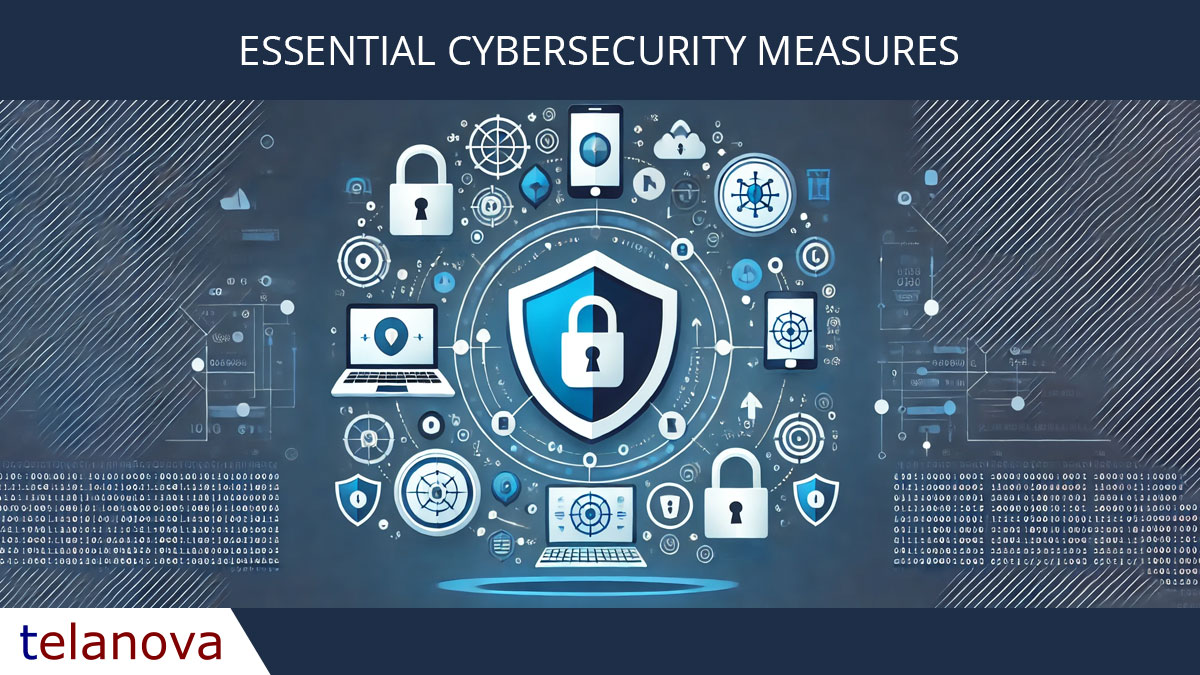Estimated Reading Time: 3-4 minutes
Small businesses are increasingly targeted by cybercriminals, making cybersecurity measures more crucial than ever. Implementing these essential cybersecurity practices can help protect your business from potential threats and create a more secure environment.
Cybersecurity Awareness Training
Cybersecurity awareness training is essential for educating employees about potential threats and creating a security-conscious culture within your business. With comprehensive training, your staff will be able to identify suspicious emails, avoid falling for social engineering tricks, and report potential threats immediately. This proactive approach not only protects sensitive data but also builds a security-conscious culture within your business.
Strong Password Policies
Enforcing strong password policies is one of the simplest yet most effective cybersecurity measures for small businesses. Weak passwords are an open invitation to cybercriminals. To put it into perspective, a weak password is like using a flimsy lock on your front door. Ensure that all employees use long, unique passwords; 14+ characters is best. To make it easier for them, implement a business-class password manager.
Implementing Two-Factor Authentication (2FA)
Implementing two-factor authentication (2FA) adds an additional layer of security to your business accounts. Think of it as requiring two keys to unlock a door instead of just one. Even if a cybercriminal manages to steal a password, they would still need a second form of verification, such as a code sent to an employee's phone, to gain access. This significantly reduces the risk of unauthorized access.
Secure Network Infrastructure and Endpoints
Securing your network infrastructure and endpoints is vital for protecting sensitive data in small businesses. This involves several layers of protection, including firewalls, antivirus/antimalware solutions, and web filtering. Ensure every device is protected, whether used in the office or remotely and implement mobile device management solutions if necessary.
Regularly Update Software and Firmware
Regularly updating software and firmware is critical as cybercriminals often exploit vulnerabilities in outdated systems. By ensuring all software is up-to-date, businesses can protect themselves from known vulnerabilities. The best practice is to make sure patches and updates are installed within 14 days of release. Enable automatic updates where available and set up a regular patching schedule for manual updates.
Monitor, Detect Issues and Respond
Monitoring, detecting issues, and responding promptly is crucial. Implementing alerts, conducting regular security audits, and possibly employing third-party services helps you identify and mitigate potential threats in real time. This could involve setting up alerts for suspicious activity, monitoring security systems and logs, and conducting regular audits.
Recommendations
Cybersecurity Awareness Training
- Conduct regular training sessions.
- Simulate phishing attacks to test and improve employee responses.
- Provide clear protocols for reporting suspicious activity.
Strong Password Policies
- Enforce the use of complex passwords.
- Implemen two-factor authentication.
- Implement a business-class password manager.
Secure Network Infrastructure and Endpoints
- Set up and maintain robust firewalls.
- Use reliable antivirus and anti-malware solutions.
- Use reliable web filters.
- Ensure your solutions cover devices wherever they're used.
- Implement mobile device management solutions.
Regularly Update Software and Firmware
- Ensure all devices have the latest security updates.
- Enable automatic updates where available.
- Set up a regular patching schedule where manual updates are required.
Monitor, Detect Issues, and Respond
- Set up alerts for suspicious activity.
- Set up alerts for security layer failures, e.g., non-functioning firewall, antivirus.
- Conduct regular security audits.
- Consider utilizing a third party to monitor your network.
FAQs
Why is cybersecurity awareness training important for small businesses?
It helps employees recognize and avoid common threats, making them an essential part of the company's security strategy.
What constitutes a strong password policy?
The current recommendation is a 14+ character password that is difficult to guess. It does not need to be complex! See NCSC's guidance.
How can small businesses secure their network infrastructure?
By implementing firewalls, antivirus/antimalware solutions, and web protection, regularly updating software, and monitoring network activity.
Why should devices connected to the network be secured?
Unsecured devices can serve as entry points for cybercriminals, compromising the entire network.
What are the benefits of using two-factor authentication?
Two-factor authentication adds an extra layer of security, making it more difficult for cybercriminals to gain unauthorized access.
Protect your small business from cyber threats.
Contact us today to learn how our expert cybersecurity services can safeguard your operations.


